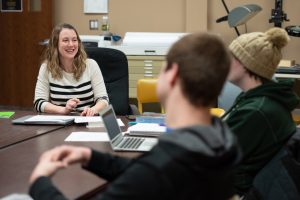09 Apr Inspiring Teacher: Kristen Fellows, assistant professor of anthropology

Kristen Fellows’ enthusiasm and zest for research set the tone for her challenging courses, and make her an outstanding role model for students.
Kristen Fellows is a historical archaeologist who studies such topics the African Diaspora in the Caribbean and U.S., ethnohistory, oral histories and race and gender.
Her enthusiasm and zest for research set the tone for her challenging courses, and make her an outstanding role model for students.
Fellows teaches a variety of anthropology courses, ranging from Biological Anthropology to Caribbean History and Cultures to Historical Archaeology and Ethnohistorical Methods.
WHAT EXPERIENTIAL LEARNING OPPORTUNITIES DO YOU PROVIDE STUDENTS?
I like to get students involved in actual research. In my Historical Archaeology class, we processed, identified and analyzed artifacts from a 19th century brothel site in downtown Fargo. In my Ethnohistorical Methods class, students get hands-on experience analyzing documents – projects have centered on NDSU’s history and the historic red light district in both Fargo and Moorhead.
Both classes have worked in tandem with public history classes led by Angela Smith, associate professor of history and public history director. My students serve as the “archaeological experts” who provide some background research and anthropological contextualization on objects that her students will then incorporate into museum exhibits.
Finally, I believe the best way to learn archaeology is by doing archaeology. In summer 2016 I took a group of NDSU students to Jamaica to participate in an archaeological field school on a colonial coffee plantation.
WHAT IS YOUR TEACHING PHILOSOPHY?
I want students to get excited about anthropology because I’m excited about what we can learn about the world around us through this critical disciplinary lens. I try to create a supportive environment where students feel like they can ask tough questions.
While sometimes I need to provide some contextual information, my ideal classroom is filled with discussion. We talk about sensitive topics and issues that can sometimes be deeply personal, so I want everyone to remember that their colleagues are individuals with their own life histories and unique perspectives. I want us all to learn together and get excited about diving deep into the diversity and variety within the human experience.
And I believe that learning is sometimes best achieved by doing.
HOW DO YOU KNOW WHEN YOU’VE SUCCEEDED WITH A STUDENT OR CLASS?
It can be halfway through the semester and they trust me and their peers enough to open up, or I’ve selected a topic or reading that really speaks to them. Whatever the reason, I feel something has gone right when students are engaged enough with the course materials to freely and excitedly talk and debate about them.
Also, when I get to introduce a student to something that is so new-to-them and you can just see their mind spinning and light bulbs going off. It’s a lot of fun.
WHAT HAS BEEN THE BEST MOMENT OF YOUR TEACHING CAREER SO FAR?
I’ve had a number of students present their findings at NDSU Explore and it’s always a proud day for me. It’s really satisfying to see them produce professional products and confidently talk about what they did to get there.
WHAT HAVE YOU LEARNED FROM YOUR STUDENTS?
Students have frequently asked questions that have led to a complete shift in my approach to a research problem. Our discussions around methods and theory have also helped me refine my own positions and my ability to explain concepts. I love the real-world examples students bring to our discussions and feel like I’m often learning about our own shared culture from them.
Perhaps more importantly, I feel the students have taught me how to be a kinder, more supportive person to those around me, as well as myself. My students juggle a lot of responsibilities and school is often just one of the many things they are focused on. Helping them navigate the issues that arise and figure out their future plans has helped me figure out what I want from life and what I would like to prioritize.
WHAT IS SOMETHING EVERY STUDENT SHOULD EXPERIENCE BEFORE THEY GRADUATE FROM NDSU?
I highly encourage every student to study abroad or just to travel to unknown places. You learn a lot about yourself, other people and how you see yourself fitting in to the world when you are forced out of your comfort zone. Being immersed in another place and culture is as much about learning yourself as it is about learning the new culture or language.
Fellows earned her bachelor’s degree at the University of Florida, Gainesville, and her doctorate in anthropology from the University of Pennsylvania, Philadelphia.


